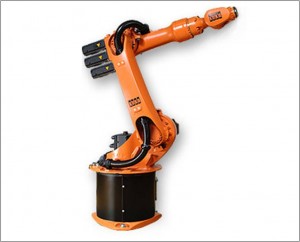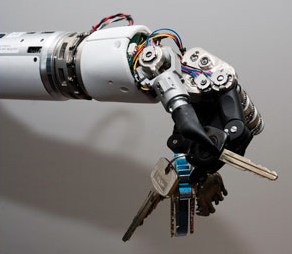or Mechatronic Engineering, humourously (but incorrectly) referred to as Megatronics at times. In Afrikaans Megatronika or Megatroniese Ingenieurswese. What is it? What can you do with it? When I started studying I didn’t know, after 5 years I think I have a vague idea. So below I’m going to post what I know.
In it’s simplest form it’s a combination of Mechanical and Electronic Engineering. If I really don’t feel like explaining, I simplify it to robotics. This is certainly a large portion of Mechatronics, but by no means a limiting factor.
Mechatronics as a named profession is fairly new, but the idea has always been there. In the South African context, UCT have had an accredited BSc (Eng) Mechatronics course since 1997 (although how long it has actually been running is uncertain), NMMU a BEng since 2007 (first graduates) and Stellenbosch since 2005 [1]. Potchefstroom University (NWU) are apparently aiming to start a course in the next few years [2]. Although not offered in the BEng format, UKZN do offer Masters through their Mechatronics and Robotic Research Group [3]. [EDIT: added list of BTech degrees and Diplomas offered at the bottom of the post]
Mechatronics at Stellenbosch [2]
I completed my BEng Mechatronics at Stellenbosch University in 2011. The Mechatronics course was presented by the Department of Mechanical and Mechatronic Engineering in a four year course. The first two years were identical to that of those studying towards a BEng Mechanical. The first year course is identical for all engineering students. In the third and fourth years, the two courses still followed similar routes, with the Mechatronics course replacing several Mechanical courses with some courses presented by the Department of Electronic and Electrical Engineering. In third year these included Electronics and Computer System’s courses and fourth year Electronics and Electronic Design Courses. Losing out on some Strength of Materials and Thermo-Fluid Mechanics.
The department put it this way [6]
The most important difference between the mechanical engineering programme and the mechatronic programme is that mechanical engineers are equipped to develop mechatronic systems with existing controllers (computers, PLC’s, etc.), while mechatronic engineers are also equipped to develop specialised controllers (e.g. for embedded controllers) and the relevant electronics themselves.
At the time, the Head of Department felt that Mechatronics as an entity was still too new. Employers weren’t advertising for Mechatronic Engineers, and didn’t really know what to do with them when they did get them. This resulted in the close ties between the Mechanical and Mechatronic courses. I was often unhappy about this, having would of preferred more focus on the Electronics, but in the end it worked out. And the HoD’s opinions were/are valid.
When I chose Mechatronics, I didn’t know where I was going to work, I chose the course because it sounded interesting. It wasn’t until my final year that I found a direction to work towards. Course setups at different universities are going to be different, and will put emphasis on different subjects, that doesn’t necessarily make one better than the other. Either way you’re going to come out of it with a degree and a fair amount of knowledge. Most importantly though (and this is true for any engineering degree) is you’ll know how to learn.
I’m quite confident that specific things that I learn in my first year of work will be of more value to my career than a specific subject at varsity, but having struggled through several subjects, I know I can figure out most things that come my way. I know where to look and how to go about solving problems.
In my final year we were a class of 85 Mechanical/Mechatronic students, of which I’d say about 30-35 received their BEng Mechatronics in 2011.
Mechatronics at NMMU [2]
NMMU have a slightly different setup. Mechatronics is presented by the Mechatronics school of the Department of Engineering, the Built Environment and IT. Mechatronics is the only Engineering degree they offer. As such, first year physics and maths are taken alongside BSc students and after the first year, courses taken are aimed only at Mechatronics students. The format of the course is still identical to that of when it started giving a good balance of subjects. The University also offers an array of BTech degrees in other Engineering fields.
I’m currently pursuing my master’s degree at NMMU. Their 4th year BEng Mechatronics class has roughly 25 students in it and the 3rd year class about 30. First year applications are limited to 60, with the most recent 1st year class starting with 50 students. The Mechatronics department is currently sponsored by General Motors South Africa (who have a plant in PE) and also have close ties to the Volkswagen plant in Uitenhage.
Mechatronics in General
Mechatronics as a career is still finding its feet. Meaning many consider it a jack of all trades, master of none type of situation, and although the course may feel that way, it’s certainly not the end of the story.
Mechatronics isn’t a new field, it’s just finally been given a name. When you tell people you’re a Mechatronic Engineer they don’t know what that is. I had a month stint at a large production facility as part of vacation training and I was asked to choose between focusing on their Mechanical or Electrical divisions, eventually settling for a bit of time at each. But that’s how businesses in SA are structured. This will change.
Several Mechatronic Engineers that I know have taken up Automation maintenance posts. Nothing wrong with this, personally it’s not where I want to be. Contrary to this though, my first job next year will be in automation maintenance. I however plan to use this as a stepping stone into a design career.
Automation is fun, and whereas I am going into automation in a production sense, automation also relates to smaller and/or more technical situations. The recent landing of the Curiosity rover on Mars is a perfect example of Mechatronic systems. There are several elements here, from the automated landing system to the remote control of the device.
In the motor industry, systems such as traction control, ABS and ESP are all examples of Mechatronic systems. Heavily complicated systems that rely on the processing of data from sensors to enable control of actuators. As such a Mechatronic Engineer can make him/herself home in many different industries. These include the Automotive, Aerospace, Manufacturing, Medical and Communications Industries.
Mechatronic Engineers can register with ECSA to become Professional Engineers [4]. The industry is governed by the South African Institute for Mechanical Engineers. I don’t see Mechatronics separating from this tree any time soon. The degree, being accredited by ECSA also means that the degree will be recognised internationally in many countries thanks to the Washington, Sydney and Dublin Accords [5]
So what do you do when you have your degree? You do whatever you want. You’ll find something. I’m not aware of any of my colleagues who are currently not pursuing a post-graduate degree or are employed. Not all of them are in Mechatronic specific posts. Some have opted for more mechanical orientated jobs, while others have gone entirely into areas such as electronic design or programming. And that’s one thing, a degree in Mechatronic Engineering in no way limits you. Very few engineering degrees will actually.
After re-reading what I’ve written, I think I’ve put forward some information relating to Mechatronic Engineering, but it’s still left fairly vague, maybe it’s just because none of us know what we’re really doing :)
A National Diploma in Mechatronics (for registration as a Professional Engineering Technician) can also be had from the following institutions [7]:
- Tshwane University of Technology
- UNISA
- Cape Peninsula University of Technology
A BTech in Mechatronics (for registration as a Professional Engineering Technologist) from [8]:
- Tshwane University of Technology
- UNISA
- Cape Peninsula University of Technology
and to reiterate, a BEng, or BScEng (for registration as a Professional Engineer) [1]:
- Stellenbosch University
- University of Cape Town
- Nelson Mandela Metropolitan University
Note: Although other institutions may offer courses in Mechatronics, or Mechanical Engineering with a focus on Mechatronic elements, the ones listed above are the only ones recognised by ECSA for registration as a mechatronic professional. Information was correct at time of posting, but may have changed since.
There are also several Universities of Technology and FET Colleges which offer courses in Mechatronics. CPUT is one of these institutions. Another training institution is Umbilo Training Specialists in Durban. They are running a free training course, once a month where anyone can come to learn more and expand their knowledge. Checkout their page for details.
For some more reading and a very complimentary view with some poignant remarks have a read here.
As part of my degree at Stellenbosch University I completed a project which can be seen here.
As part of my master’s degree at NMMU I completed a project which can be seen here and here.
If you’re looking for bursaries, try this website.
If you have any questions, feel free to ask in the comments section.
- [1] ECSA – Accredited Universities
- [2] Much of what is stated comes from my own experiences and conversations with relevant people.
- [3] UKZN – Mechatronics and Robotics
- [4] ECSA – Registration
- [5] ECSA – Recognised Qualifications
- [6] Stellenbosch University – Mechatronic Engineering
- [7] ECSA – Accredited Diplomas
- [8] ECSA – Accredited BTech





Hi there
I am currently in grade 12 and i live near Johannessburg area. please can you help me with what i should do to get started in studying mechatronics and which recognised universities in Johannesburg offer mechatronics.
Much appreciated
Hey Mohammad,
Neither Wits nor UP offer a dedicated Mechatronics course, however UP’s mechanical engineering degree does offer a Mechatronics elective, and along with a Mechatroincs final year project would offer a good start to a career in Mechatronics. Alternatively UNISA and TUT both offer a BTech in Mechatronics.
As for getting started, look around for any local robotics programs, I know South Africa doesn’t have a lot of opportunities, but look around at local schools. Also if starting university, look for a robotics club, where you might get more practical experience than what the purely theoretical classes will provide.
good luck.
Hi Garethc
Is it possible for someone who did BEng Tech mechanical engineering and BEng Tech Hons in mechanical engineering at NMU to do MSc in Mechatronics engineering or in MSc in Mechanical and Mechatronics engineering?
Hey Ncedo, when you say BEng Tech, do you mean BTech?
If you’re interested, there are definitely opportunities, but it’d be best to approach institutions, or professors at the university to find out more.
NMU mention the following:
“Candidates who have completed Bachelor of Technology in a relevant field may be eligible, at the discretion of the Faculty Management Committee. Additional coursework may, however, be prescribed.”
Awesome! Just hope it advances to grant admission even to those in other part of the world
Hi Gareth
I’m in matric this year and I’m interested in Mechatronics. Could you please share your experience, what it entail, and employability
Hi Lefo, Mechatronics is very broad. A large part of it in South Africa relates to factory automation, but there are also opportunities in other industries. Employability with any engineering degree in South Africa is fairly high, and Mechatronics is gaining popularity, a lot depends on how flexible you’re willing to be with the work you want to do, or if there are very specific jobs you want to work towards.
Hi Gareth. My son has applied at UCT, Stellenbosch and CPUT for 2023. Please rank the institutions i.t.o where you think he should study.
Regards
Catherine
Hi Catherine,
It depends a lot on the type of work your son is hoping to do or is most interested in.
UCT and Stellenbosch both offer BEng degrees, whereas CPUT offers a BTech degree. The content of each course can be very different, and it is hard to say that one is better than the other.
The content of each course should be compared with regards to your son’s strengths, and goals. Also take into consideration other factors, such as where they will stay, how far they may have to commute, and other aspects that can have an impact on one’s studies.